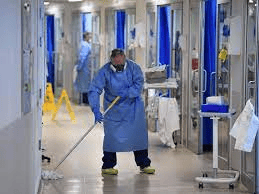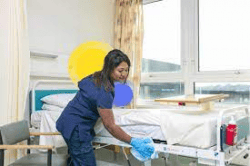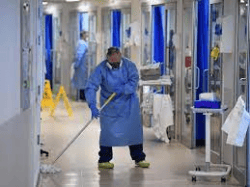Several essential cleaning requirements should be met in hospitals. Those who work in hospitals should take responsibility for ensuring that the rooms are sterile and hygienic. Cleaning should be done at least twice a day for most areas and should include frequently touched surfaces like sinks, door handles, push plates, call bells, and equipment. These surfaces are vulnerable to infection and should be cleaned comprehensively. Environmental services should focus on thorough cleaning of these surfaces to ensure patient safety.
Moreover, hospitals must have certified staff to perform these tasks. However, few hospitals have such a system. Even those that do have training for cleaning need to ensure they are able to perform their jobs properly. Hospitals also need to know how to assess their cleaning costs, since this aspect can affect many hospitals’ budgets. Hence, hospitals must measure the costs of environmental hygiene by looking beyond actual expenditures to include the cost of averting expenses.
As mentioned before, cleanliness is one of the most important factors that affect patient safety. Yet, hospital cleanliness has only recently been recognised as a major issue in the area of infection prevention. To address this issue, an infection control team should also play a large part of a hospital’s strategy for addressing hygiene and sanitation.
In a healthcare facility, cleanliness is crucial. People come into contact with blood samples on a daily basis, and germs are transferred from frequently touched surfaces. Hiring a professional cleaning company can ensure good hygiene in the healthcare setting. For more details on Contract Cleaning Cheltenham, go to biggreencleaning.co.uk/
Increasing salaries and incentivising cleaners can make a significant difference. These incentives can take the form of additional cleaning supplies and PPE. In the long-term, this multimodal strategy should be tied to national quality initiatives and aims.
Few facilities have systems in place to train cleaning staff. Aside from that, it is important to recognise and reward cleaning staff with certification. The more people are certified, the more effective their work is. Cleaning personnel are often the frontline workers in the fight against infection. Therefore, they must be given the proper recognition and training in order to be able to do their jobs well.
The importance of cleanliness in healthcare facilities is a key aspect of patient safety. Despite this, hospitals have only recently begun to acknowledge the value of cleanliness in infection prevention. The Healthcare Cleaning Forum, which was recently held at Interclean, the largest cleaning trade-show in the world, was the result of this effort. Leading healthcare environmental scientists from across Europe came together to discuss the importance of keeping hospitals clean.



